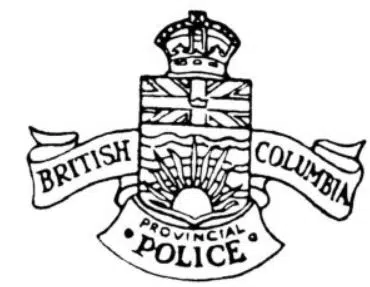
The logo of the former BC Provincial Police which was dissolved in August 1950.
An all-party committee at the BC Legislature is calling on government to get rid of RCMP and create a provincial police force.
In a report released Thursday, the committee says transitioning to a provincial police service does not reflect the work on RCMP officers, but rather notes it comes because of “several challenges related to governance structures” as communities can have an unequal level of involvement in police governance.
It says municipalities like Vancouver with independent police departments have municipal police boards which hold police officers accountable but those boards do not exist for municipalities like Kamloops that are served by the RCMP.
It notes that while senior RCMP officers and detachment commanders engage with local communities, the big governance decisions are made in Ottawa.
“The committee recommends that a new provincial police service take over services formerly contracted to the RCMP,” the report said.
“As with the current model, municipalities would still have the opportunity to establish a municipal police service, contract with the provincial police service, or enter into an agreement with another municipality or Indigenous community that has a local police service to meet their policing needs.”
The move to a provincial police force was one of 11 recommendations from the Special Committee on Reforming the Police Act.
“British Columbians highlighted significant challenges in the structure and delivery of police services, which have contributed to a lack of trust in these services,” Nanaimo-North Cowichan MLA, Doug Routley, the committee chair said, in a statement. “The committee’s report outlines a new vision of policing and community safety rooted in decolonization, anti-racism, community and accountability.
“Our recommendations aim to ensure equitable access to high-quality police and community safety services across the province and provide police officers with the tools and supports they need to deliver these services.”
The committee also recommended that a significant increase in mental health services be integrated into the province’s 9-1-1 emergency response system.
“Police have become the default first responders to mental health and other complex social issues due to a lack of alternatives and supports,” Peace River North MLA Dan Davies, the committee’s deputy chair, said in the Legislature Thursday.
“Significant investments into a continuum of response, as well as increased co-ordination and integration across sectors, are needed.”
The previous British Columbia Provincial Police was dissolved in August 1950, and replaced by the RCMP’s “E” Division, which is headquartered in Surrey. What is not clear yet is how much a new B.C. provincial police service would cost taxpayers.
In a statement, the Commanding Officer of the BC RCMP says efforts to evolve, modernize and enhance policing are already underway
D/Commr. Dwayne McDonald says the RCMP will be reviewing the committee’s report and recommendations, noting they won’t speculate on the next steps until that process is complete.
The current RCMP contract runs until 2032 and McDonald says they look forward to continuing to work collaboratively with the communities that they serve.
“We value the many strong relationships we have with our Indigenous, Regional District and Municipal partners and stakeholders,” he said. “” am very proud of the RCMP team that works incredibly hard everyday to keep BC communities safe and secure and we remain committed to doing so.”
You can read the full 96-page report here.
The committee’s 11 recommendations are listed below:
1. Implement a new Community Safety and Policing Act to govern the provision of policing and public safety services based on values of decolonization, anti-racism, community and accountability.
2. Transition to a new B.C. provincial police service that is governed by the new Community Safety and Policing Act. This includes ensuring municipal council representation on municipal police boards or committees, while not allowing the mayor to serve as board chair.
3. Ensure all Indigenous communities have direct input into their police service structure and governance, including self-administered services that could provide policing to neighbouring non-Indigenous communities.
4. Create and appropriately fund a continuum of response to mental-health, addictions and other complex social issues, with a focus on prevention and community-led responses and ensuring appropriate first response.
5. Ensure equitable access to high-quality police and public safety services across B.C.
6. Create a fair and equitable shared funding model for municipalities. This include exploring options to phase in or incrementally increase the municipal share of policing costs.
7. Enhance and standardize initial and ongoing police education and training to reflect key values and competencies in order to shift police culture.
8. Require police services to collect and publicly report disaggregated race-based and other demographic data and conduct comprehensive reviews of and amend policies and procedures to address systemic racism in policing.
9. Establish a single, independent, civilian-led oversight agency responsible for overseeing conduct, complaints, investigations and disciplinary matters for all police and public safety personnel with powers or authority under the new Community Safety and Policing Act.
10. Immediately appoint an all-party parliamentary committee to undertake a broad review of the Mental Health Act with a view to modernizing the Act and ensuring it aligns with the recommendations in this report.
11. Establish an all-party select standing committee on policing and community safety.
















